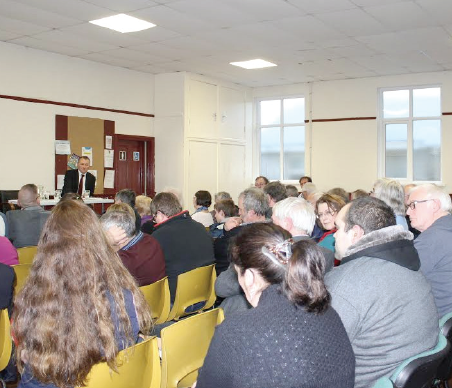 A MEETING was held on Wednesday for those living in rural communities to express their concerns over the BT Superfast internet rollout.
A MEETING was held on Wednesday for those living in rural communities to express their concerns over the BT Superfast internet rollout.
The Director of Superfast Cymru, Ed Hunt, attended the meeting, held at Whitland Memorial Hall, to answer questions from those concerned about delays and omissions from rollout. BT has claimed that 95% of the population of Wales will have access to fibre broadband.
Although the meeting started at 6pm, the hall was packed to capacity, with more than 80 people in attendance. It was immediately evident that the topic resonated with many in the area. Most of those present were from the rural west Carmarthenshire and east Pembrokeshire area, where a number of communities are hampered by very slow internet speeds – down to less than a megabyte per second (MBPS). By contrast, those receiving the full benefits of the Superfast upgrade will reach speeds of 24-32 MBPS.
Mr Hunt began by pointing out that the reason that the Welsh Governmentsubsidised scheme had been rolled out was ‘because no communications company wanted to take the risk.’
“I’m not the problem – I’m fixing the problem,” he added, stating that without BT there would be no Superfast Broadband at all in the region.
Defending criticisms that the rollout was too slow, Mr Hunt claimed that the Welsh rollout by BT was the fastest in the UK. He added that New Zealand, which he described as a similar kind of country to Wales, aimed to have reached 85% of people by 2023. “Wales will have achieved that by next year,” he said.
It was also claimed that Wales was in a better position in terms of Superfast coverage than France, Germany, the United States, and the rest of the UK.
However, Mr Hunt acknowledged: “You guys are here because you haven’t got it – I understand.”
He explained that the contract with the Welsh Government did not cover 100% of Welsh houses, and expressed doubt that in some cases it was even possible to provide a service. “Some people here are not going to get good news,” he added, before explaining that there were certain grants available from the Welsh Government to assist in these cases.
Mr Hunt also pointed out that those present were in a minority in more ways than one, and that only around 12% of the population of Carmarthenshire had taken up the Superfast option. In Pembrokeshire, around 25% had.
“Providers won’t come down here, because there is not the clamour for the service that people think there is,” he claimed.
However, a number of residents present seemed less-than-convinced with the glowing picture painted. Whether or not, as was implied, this was because most of those present were among the have-nots, the questions from the floor offered a wide-ranging criticism of the rollout and general BT policy in the region.
Simon Hart MP, who organised the meeting, pointed out that vagaries in the rollout times had stopped people taking up temporary solutions like satellite internet for fear of losing out financially.
In response to a point made by Mr Hunt, who had said that BT was willing to work with customers in locations outside the rollout if they were willing to carry out some of the infrastructure work or costs themselves, he pointed out that a pensioner in his constituency had been quoted £180,000 by BT to get the full service.
Mr Hunt said that this ‘illustrated the difficulties of the project.’ He suggested that possibly a local resident with a JCB might like to lend a hand to keep the costs down.
BT was accused of neglecting the existing network in the race to install fibre-optic cable, with a number of people claiming that they had been without the internet for lengthy periods over the winter due to repeated cable breakages.
One Whitland resident pointed out that they were unable to get even 1MBPS ‘one-and-a-half miles from the A40’ and asked why it wasn’t possible to get even 2MBPS through the existing copper network.
Mr Hunt’s claim that ‘we don’t have a reliability problem’ was met with a chorus of ‘no, we do’ from the audience. He pointed out that he was ‘not in business to provide a 2MBPS service’ and advised the questioner to ‘take it up with the Welsh Government’.
An audience member from Meidrim pointed out that work there had been delayed for several months because the cable had to cross a level crossing.
In response, Mr Hunt said: “I don’t have to deliver to your house by the end of March, but I have to deliver to a certain number of properties across Wales. If we have snags, I am entitled to move engineers when I see fit.”
Another Meidrim resident was somewhat disgruntled that a fibre cable between two exchanges ran past her garden gate, while she was only able to get 2KBPS internet in her house.
The number of properties which would actually benefit from ‘Superfast’ speeds of more than 15MBPS was also questioned, given that any property more than 1.5km from a cabinet would only get fast broadband. The Village Clerk for Martletwy claimed that she had checked online, and out of 300 properties in the area only 15 would get the full Superfast benefits.
Several representatives of the business community pointed out that good broadband service was essential for attracting and running businesses in the region. Given the focus on tourism in west Wales at present, it was also noted that decent internet speeds were a priority for those booking holiday cottages, which often tend to be in more remote areas.
In response to those who asked why south east Wales had received the service upgrades first, Mr Hunt replied that due to the project being delayed by external forces at the beginning of the rollout, BT had been forced to concentrate on areas with higher population density in order to meet the targets set and avoid jeopardising EU grant money.
As the tone of the questions became increasingly heated, Mr Hunt said: “I can’t give all the people the answer they want tonight. I didn’t have to come here, but I am happy to.”
He also reiterated that: “If it wasn’t for BT coming in and putting money on the table, you would have nothing.”
It is worth noting that BT has made a £220m investment in the project, which has an estimated payback time of 15 years.
Mr Hart pointed out that in his opinion, given where internet provision was in this region five to ten years ago this was ‘still a good news story’. He also refuted Mr Hunt’s claim that all those present were there because they didn’t have access to the service: “We are all here not just because we don’t have Superfast broadband, but because of confusion about when we are going to get it,” he added.
However, the last word was had by a gentleman who referred back to previous concerns about copper cables from exchanges to houses: “Superfast broadband is theoretical, and will remain entirely so for everyone in this room until the copper cables are replaced,” he said.
After the meeting, a number of one-to-one sessions were had with audience members, who received answers to specific questions about service provision.
Speaking to audience members, a number believed Mr Hunt had been somewhat arrogant in his approach, and his remark that he ‘didn’t have to come here’ was quoted more than once. However, others were more encouraged, with one lady saying he was ‘a brave man for coming!’
A common theme was a perceived lack of maintenance to the existing system – something that Mr Hunt had earlier refuted – and the communication between the company and residents was described as ‘abysmal’.
Simon Hart said that he hoped the meeting had been ‘the first of a process’.
When we suggested that these problems were only experienced by a small minority of residents, he said: “I don’t buy the argument that most people are happy. As long as one person is left out in the cold we should pursue this vigorously.
“We have heard quite legitimate concerns tonight. People understand that this is a slow, expensive process, but want to hear the truth, and to have things explained to them.
“I hope that the BT representatives leave here tonight realising that it is not all a good news story.”
However, Mr Hart refuted criticism of Mr Hunt’s perceived ‘arrogance’: “If I was in their shoes, if your life is spent working for BT, I think you will be quite defensive,” he said.
“What tonight was about was saying that yes, we are grateful, but there are areas that need to be addressed.”


















Add Comment